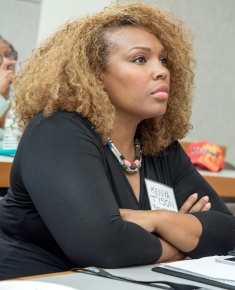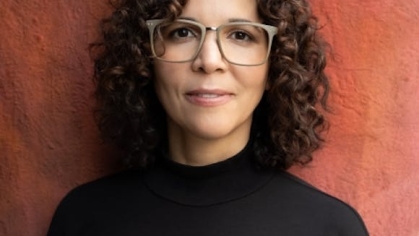On November 11, the Rutgers School of Criminal Justice (SCJ) at Rutgers University-Newark (RU-N) served as the site for spirited discourse on “The Future of Policing: What Does it Mean for Our City?” Nestled in one of Newark’s anchor institutions that proudly acknowledges being of Newark, not just in Newark, government officials, community leaders, activists, and students gathered to engage in productive dialogue about best law enforcement practices for Newark’s constituents.
The New Jersey Communities Forward (NJCF), a not-for-profit initiative of the New Jersey Institute for Social Justice (NJISJ), convened more than 100 individuals to discuss effective policies concerning law enforcement issues facing the city of Newark. NJCF works to engender a coalition for change on issues of criminal justice and economic opportunities and build bridges for communication between groups in urban areas that historically harbor distrust among each other.
Foremost on the minds of those attending the forum at RU-N were guidelines for body-worn cameras, creation of a civilian review board for policing matters, and the status of measures recommended in the Federal Consent Decree for the city of Newark. The guest panel invited to provide brief updates on these topics included Assistant United States Attorney Michael Campion, civil rights coordinator of the United States Attorney’s Office; Elie Honig, director of the New Jersey Division of Criminal Justice; James Johnson, member of NJISJ’s Board of Trustees and founding member of NJCF’s Steering Committee; and Fatimah Muhammad, director of Equal Justice USA’s Trauma Advocacy Initiative.

Following the presentations, participants assembled into small groups of approximately 10 to share ideas. The topics of their discussions included: community policing, training for law enforcement, law enforcement hiring and recruitment efforts, building trust between police and the community, the role of schools and education, and the vision for law enforcement and community relations. The groups noted the importance of activities that meaningfully engage law enforcement and citizens, the need for continual implicit bias sensitivity training, and the desire to introduce law enforcement to school-age and preschool children as early as possible, among many other viable suggestions.
Lori Scott-Pickens was instrumental in organizing the Newark forum. As director of community outreach/community-based learning for SCJ and a member of NJCF’s Steering Committee, Scott-Pickens recruited students from SCJ’s Masters Program (Christopher Bollinger, Maureen Darby, and Lucas Abrunzo) and Rutgers Law School (Farah Muhammad and Annabel Pollioni), identified Newark-based community partners and coalitions, and facilitated program planning.
“I am happiest when I am able to connect the work of SCJ to work with and for the community,” says Scott-Pickens. “This event truly represents the best of all worlds. It includes our students, government, and the community engaged in conversation about public safety in the city of Newark. I also have the great fortune to have the support of both SCJ Dean Shadd Maruna and SCJ Associate Dean Kenya Tyson, who encourage SCJ’s outreach activities to include events such as this one.”
Participants heard greetings and remarks from Ryan Haygood, chief executive officer and president of NJISJ, Newark Mayor Ras Baraka, New Jersey Attorney General John Hoffman, United States Attorney Paul Fishman, and SCJ Dean Shadd Maruna. Kenya Tyson, SCJ’s associate dean of academic programs and student services, closed with a plea for everyone’s continued interest and activism.
The forum’s sponsors included: NJISJ; NJCF; SCJ; National Organization of Black Law Enforcement Executives (NOBLE); Urban League of Essex County; Independence Family Services, of NJ Inc. (IFS); The Brickerati Group; YouthBuild Newark; LISC Greater Newark; National Association for the Advancement of Colored People (NAACP); and New Jersey Office of the Attorney General.
(Top photo (l-r): Shadd Maruna, Lori Scott-Pickens, Paul Fishman, and John Hoffman; photo credit: Shelley Kusnetz)
(Bottom left photo of Kenya Tyson by Kelley Kusnetz)


